Do you experience a wound, chronic pain or thermal burn that won’t heal? No worries! Hyperbaric oxygen therapy is the best treatment for you. HBOT is a great way to speed up healing wounds of all kinds. But with any medical treatment, it is important to know their possible side effects.
Hyperbaric oxygen therapy (HBOT) is a relatively safe treatment for many conditions. However, there are specific side effects also. When side-effect data of patients were collected from 2009 to 2010 that were treated in Monoplace hyperbaric chambers, the rate of side effects was estimated to be around 0.4%. Approximately half of all adverse outcomes are classified as “ear pain,” and a quarter as “confinement anxiety.”
Two types of issues are associated with hyperbaric oxygen treatment: pressure side effects and oxygen side effects. Barotrauma is a pressure-related side effect that can affect any closed, air-filled space. Oxygen side effects are further classified into three types:neurologic, pulmonary, and ophthalmologic. Confinement anxiety is caused by the physical space of the chamber rather than an actual issue.
Hyperbaric Oxygen Treatment Side Effects
As with any medical procedure and treatment, hyperbaric oxygen exposure may have some adverse effects. These are quite unusual. Here is a list of some of the potential side effects of hyperbaric unit oxygenation:
Barotrauma, or Ear or Sinus Pain
This happens when you can’t equalise the pressure in your ears or sinuses. If you feel ear or face pain, you should contact the technician immediately. Staff can assist by reducing or stopping the pressurisation operation. They will instruct you on ways to equalise ear pressure. If left untreated, this unrelieved pressure might cause harm to the eardrum or sinuses.
Pneumothorax with Cerebral Air Embolism
When there is a sudden change in air pressure, the lungs can rupture, allowing air to escape into the veins or the chest cavity outside the lungs. This can happen only if the normal air out of the lungs is obstructed during decompression, which can occur if you hold your breath, cough, or clog your nose with mucus (as with a bad chest cold). To reduce this, only modest decompressions are used in hyperbaric oxygen treatment.
Toxicity from Oxygen:
The risk of oxygen toxicity is reduced by never limiting yourself to higher pressures or for longer periods than are known to be safe for the body and its organs. This would cause dizziness, facial twitching, and nausea. If the oxygen level is not reduced, this can result in a seizure. If you see any of these symptoms, please notify the staff immediately.
Fire Risk:
When you get the appointments or buy oxygen and an oxygen chamber for home use, there is an increased risk of fire when using oxygen in any form, but strict safeguards have been made to prevent this, and the unit conforms to all requirements.
Risk of Near-Sightedness Worsening
(Myopia) It is likely that after 20 or more treatments, especially if you are over 40 years old, you will lose your ability to see things far away. Understand that this is only temporary and that vision typically returns to pre-treatment levels around six weeks after therapy is stopped.
Cataracts That Are Maturing or Ripening:
It has occasionally been established in persons with cataracts that cataracts mature or ripen.
Temporary Gain in Far-Sightedness:
(Presbyopia) After 20 or more sessions, especially if you are over 40 years old, you may notice an increase in your ability to see objects up close or read without reading glasses. However, this is thought to be transient, and your vision should return to its normal level of acuity in about six to eight weeks after medication is stopped.
Fluid in the Ears:
Fluid in the ears might build up from breathing in high concentrations of oxygen. It may seem like a pillow over your ears at times. This usually goes away after the treatment and can be relieved with decongestants.
Fatigue:
Some persons may have weariness subjectively after hyperbaric treatment, but this is not a common finding.
After oxygen booking, you must know about all the complications and precautions of this treatment. If you feel unwell after the HBOT, you must call your doctor immediately.





